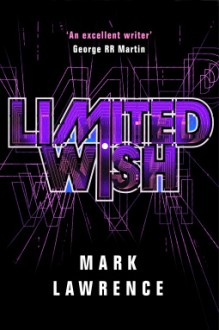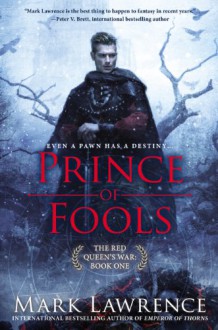
I had fun reading this book. I don't think I can get that across with plot summaries so I'm giving an overview and then sharing the notes I made as I went along.
I recommend the audiobook version of 'One Word Kill'. Click on the SoundCloud link below to hear a sample.
Overview
Set in England in 1986 Mark Lawrence's new YA book, the start of a new series, tells the story of a D&D playing, teenage boy, dying of cancer, who gets the chance to save the first girl he's ever gotten to talk to like she's a real person.
It's not a cosy book - too much clear thinking and physical pain and too many encounters with nasty people for that - but it's a hopeful book, as long as you believe in the power of imagination and advanced mathematics.
The ending of the book seemed pretty final (in a quietly satisfying way) so I'm curious to see how Mark Lawrence will carry this forward into a series but, when he does, I'll be buying it.
12% Mark Lawrence Does It Again.
My first encounter with Mark Lawrence was with 'Red Sister' - the first book in a fantasy trilogy. In my review I said:
'Reading “Red Sister” was like watching a Tarantino movie, (not the ones with the clever scripts, more like “Dawn til Dusk”) only without the humour, You find yourself spellbound by the action and repulsed by the people.'
Mark Lawrence handles difficult topics (Child slavery in 'Red Sister' a teenager dying of cancer in 'One Word Kill') from a different angle than the ones I'm used to. He doesn't trivialise or sensationalise them. He looks at them afresh with a, 'So, this is happening - now what?' mindset that makes them fresh both in their pain and their hope.
Here's what the publisher's summary says about 'One Word Kill':
In January 1986, fifteen-year-old boy-genius Nick Hayes discovers he’s dying. And it isn’t even the strangest thing to happen to him that week.
Nick and his Dungeons & Dragons-playing friends are used to living in their imaginations. But when a new girl, Mia, joins the group and reality becomes weirder than the fantasy world they visit in their weekly games, none of them are prepared for what comes next. A strange—yet curiously familiar—man is following Nick, with abilities that just shouldn’t exist. And this man bears a cryptic message: Mia’s in grave danger, though she doesn’t know it yet. She needs Nick’s help—now.
He finds himself in a race against time to unravel an impossible mystery and save the girl. And all that stands in his way is a probably terminal disease, a knife-wielding maniac and the laws of physics.
This is about as accurate as a Tory spin doctor's summary of COVID-19 mortality rates.
It makes it sound like this is a Brit version of 'Ready Player One' - all cheery against-the-odds heroism and happy endings.
But it's written by Mark Lawrence, so I knew that couldn't be right.
Nick is fifteen, has been diagnosed with terminal cancer and is going through his first bout of Chemo-Therapy. There's nothing funny about it, especially when Mark Lawrence makes Nick into an extremely bright, self-aware fifteen-year-old with no illusions about what's going on.
I wouldn't normally let myself read a book where the main character has cancer. I've seen to many people die of it. Yet I'm reading this because I know Mark Lawrence won't just pour sorrow down my throat like a CIA waterboarder,- He'll play the same trick on me that real-life does. He'll add something to make me keep going. Something that feeds my curiosity even when I see no hope.
So, here I am, two chapters in, and he's made me laugh and cry; he's strung sentences together that make me go, 'I'd like to have written that' and he's got me wanting to know what happens next even though I'm watching a teenage boy die.
Here's some of the text that has me hooked:
Nick, in his hospital bed, getting Chemo:
"They had us arranged by length in treatment so the ward looked rather like an assembly line, taking in healthy children at one end and spitting out corpses at the other.'
And
'If crisp white linen and no-nonsense smiles could cure cancer nobody would ever die of it.'
Nick describing a frightened girl who can't stop talking and who has to stay on the ward after his temporary release:
'She kept talking as I followed Mother out, as if the conversation were a rope and if she only kept it unbroken I would be held by it, unable to leave.'
What does it say about me that I can feel my heart hurt as I read these words and yet still admire how perfectly they say what needs to be said?
Then there are Nicks descriptions of his D&D friends:
'John’s one annoying habit was that he spoke his laughs. He didn’t laugh like a normal person . . . he said ‘hah’. It made me less willing to trust him. Laughter should be unguarded even if nothing else is.'
And
'John and Simon went to the same school as me, Maylert, a private school nestled up against the banks of the Thames. You didn’t have to be rich to go there, just not poor... ...Simon's parents weren't rich, a teacher and a university lecturer, but they stumped up the fees so that Simon would get beaten less viciously and by a better class of bully. Simon has "victim" written all over him: overweight, obsessive, and blessed with a set of social graces that made me look suave.'
This shows me Nick has always seen things clearly and isn't just waking up because his blood is trying to kill him.
If this book stays like this, with Mark Lawrence wringing my emotions while dragging me along leashed by my curiosity and my attraction to his sharp-edged words, I'm going to be exhausted but happy by the time I finish it.
32% Teenage Nerd Heaven
Despite all the pain around the whole dying of cancer thing, I'm enjoying losing myself in this.
It's a Young Adult book that works just fine for adults and is pitched at the kind of young adult I used to be - the nerdy kind that liked the mind-bending bits of science, even if I didn't have the maths to understand them properly.
The book is set in 1986. when I was in my late twenties and all I knew about Richard Feynman was what he wrote in "Surely, You're Joking Mr Feynman!" which is a set of humorous anecdotes and a lot of that went over my head.
This wouldn't have been a problem for fifteen-year-old Nick, who is reading Feynman's 'Quantum Mechanics and Path Integrals' when Mia, a girl who has recently joined Nick's D&D group pops by unexpectedly for the first time, dressed in full goth regalia.
I loved that, after some initial awkwardness with Nick's rather surprised and not sure what to do next Mother (remember those days?) Mia asks Nick what he's reading and we get this exchange:
‘Quantum mechanics.’ I held up the book.
‘Cool.’ Mia sat on the bed. Closer than friends normally sit next to friends. She smelled of patchouli oil. I liked it. ‘What’s that about then?’
‘Well . . . it’s about everything, really. It’s the most accurate and complete description of the universe we’ve ever had. It’s also completely bonkers.’ I hesitated. I was pretty sure this wasn’t what you were supposed to talk about when girls came to visit.
‘More bonkers than general relativity?’ Mia took the book from the death grip I had it in. ‘The twins paradox is hard to beat.’
With a sigh, I relaxed. She was one of us! The magical power of D&D to draw together people who knew things. Who cared about questions that didn’t seem to matter.
I also liked the way Nick gets the attention of a UCL Physics Professor - its nerd wish-fulfilment all the way:
Professor James had seemed rather surprised to see me at his door. He asked me if I were lost. I answered by asking him if he had considered the Ryberg Hypothesis in non-Euclidian manifolds above five dimensions, because it suddenly became provable, and that fact had powerful implications for high order knot theory. After that, he was all mine.
And then there are the jokes that only nerds make. When Nick arrives at the next D&D session, Mia greets him with:
‘Of all the worlds, in all the universes, he walks into mine.’ Mia wrapped the Casablanca quote around Everett’s many-world interpretation and gained yet another level in my esteem.
Yep, these are my people, or at least, I'd like them to be.
80% An interesting take on violence, especially in a YA book
I think this is more than a YA book. The ideas work well for readers of any age. This quote, about the impact of the broken violent ones among us, in this case, a guy called Rust, is a great example of that..
‘creatures like Ian Rust were like the cancer cells among the crush of blood cells in my veins. Rare, but requiring only one to begin to pollute everything around them. Because ugliness multiplies, and hurt spills over into hurt, and sometimes good things are just the fuel for evil’s fire.’


 Log in with Facebook
Log in with Facebook 










